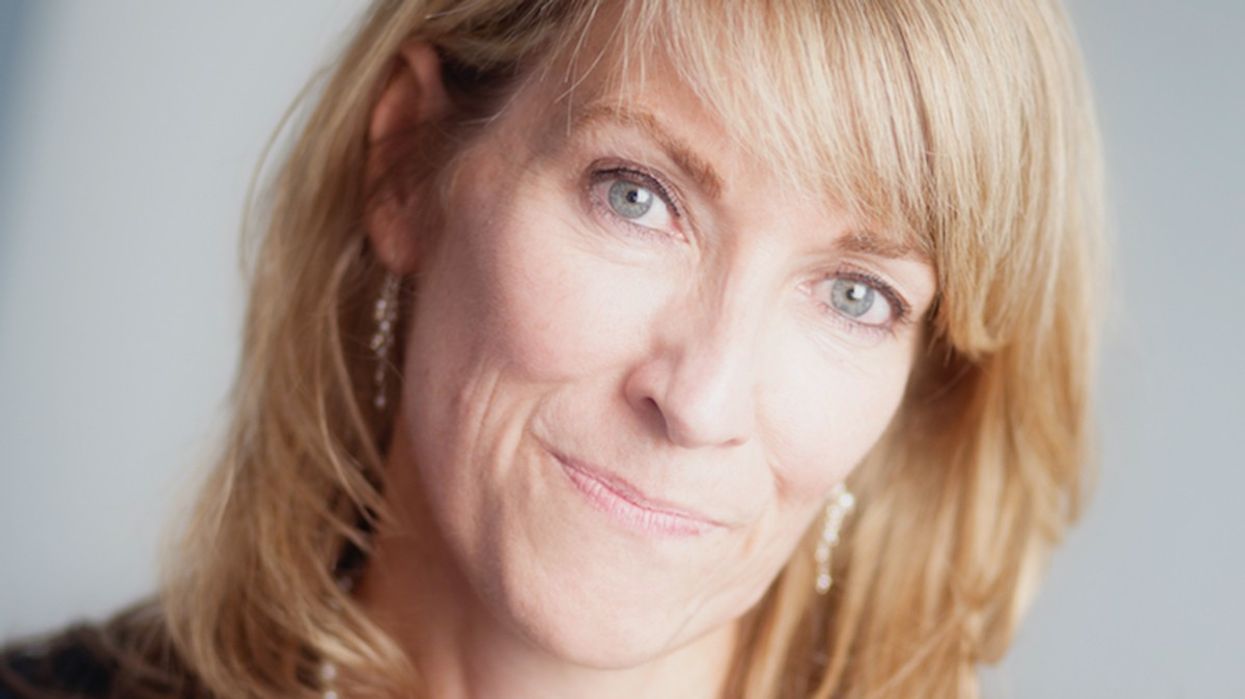Doctor Q&A: I had a heart attack weeks after getting vaccinated - are the two linked? Dr Renee Hoenderkamp answers all your burning questions

Celebrity NHS doctor Renée Hoenderkamp addresses GB News members' burning questions
|Doctor Renée Hoenderkamp

In this week's Q&A, celebrity NHS Doctor Renée Hoenderkamp addresses why cancer rates are rising in young people, the link between Covid vaccination and heart attacks and what to do about ankle swelling.
Don't Miss
Most Read
Latest
Deferring to the scientific consensus on any given topic is critical because research will always throw up anomalies or conflicting conclusions.
Progress is only made possible by agreeing on a certain set of assumptions, testing them out in practice and then error-correcting as you go along.
It may not be perfect but it's the best tool we have in our pursuit of knowledge.
It is worth keeping this mind as you read this week's Q&A with our celebrity NHS Doctor Renée Hoenderkamp.
The questions submitted via health@gbnews.uk reflect deep-seated fears about scientific unknowns. Our resident doc attempts to address these fears by drawing on the best available data as she answers questions on the link between Covid and heart problems, rising cancer rates in young people and more.
It's important to remember that the advice given below is general and not individual and you should always seek individualised health care from a doctor.
With those caveats aside, see below Doctor Hoenderkamp's answer's to GB News members' burning questions.
I had the jab during the pandemic. I am a former soldier and was a professional sportsman so have always been incredibly fit. Seven weeks after getting the Covid jab I had a heart attack and believe the two are related. Is there any evidence of this?
This is a really difficult question to answer because any kind of literature search will say that there is no connection between Covid vaccines and heart attacks.
However, let us not forget that as Covid progressed the same literature told us that getting covid did not confer natural immunity, that natural immunity was not as good as vaccine, that the vaccines did not cause blood clots, that the product stayed in the muscle in the arm, that children were carriers of covid more than adults and more and all of these are now proven wrong.
There are always many factors to be taken into consideration, for example, cardiac events, like heart attacks, are one of the most common causes of death in men and heart disease, like blood pressure can develop silently without you knowing what is going on. Being fit previously is not a guarantee get out of jail card as you age, especially if you don’t maintain fitness, normal BMI and healthy habits. So, what I am saying is, without knowing you individually, it's complex.
Having said that, let's look at what we do know.
AstraZeneca recently admitted for the first time that its Covid vaccine causes a very rare blood clotting condition. This vaccine has now been withdrawn.
The other vaccines are mRNA vaccines. They are known in some to cause myocarditis (inflammation of the heart), more so in men, particularly young men. This can be self-limiting or more severe with long term heart muscle fibrosis, and as a GP sadly I have seen one such case which has been written up here.
In one review of case studies the authors did find heart attacks in over 75s after mRNA vaccination.
There is also a documented increase in palpitations or irregular heart rhythms, particularly in young men and this paper details this and rightly says that “heart rhythm disorders are not a negligible issue, and there are red flags in the literature about the risk of post-vaccination malignant arrhythmias in some predisposed patients”.
There are some doctors calling for the vaccines to be halted due to the clear heart effects about which we don’t yet have enough clarity and in my view, it doesn’t matter how rare a side effect, for the person affected it is catastrophic which is why transparent, fully informed consent is essential, which I do not believe has happened.
So overall, whilst the literature is still reporting that the vaccines do not cause heart attacks, I feel that there are enough proven other heart effects that it cannot be dismissed as easily as some would like.
It is also important to stress that the risks posed by vaccination remain vanishingly low and the benefits overwhelmingly outweigh the risks posed by catching Covid: the mass vaccination programme rolled out during the pandemic is estimated to have saved one million lives in Europe alone.
And a new study of 20.5 million people in the United Kingdom, Spain and Estonia found the Covid vaccines to be safe and effective at reducing the cardiovascular complications that can directly result from contracting COVID-19.
The most important thing in all of this is that you are doing okay now, which I certainly hope you are.
Why are cancer cases on the rise in younger people?
This is a question that won’t benefit from the space I have here to answer but I will try and give you an outline of my thoughts!
I want to wind back a bit before that because this is a topic that has been interesting me for a while and there are some other facts which must play in to this which have been going on for the last three decades. Global cancer cases in people under the age of 50 rose by 79 percent between 1990 and 2019, according to new research. Cancer deaths in the same age group also grew by more than 27 percent, with more than one million under-50s a year now dying of cancer. There is no reason to assume that this suddenly stopped at 2020, and did not have a role to play in the excess mortality being discussed in a recent BMJ paper.
So, why are more young people getting cancer and dying from it?
I recently had a good conversation with Professor Angus Dalgleish and I think I concur entirely with the oncologist's view. This is that there are multiple factors at play and when they coincide with a pandemic that saw our government lock the country down and make our health service in to a Covid service, the result was catastrophic. These factors include an increasing percentage of the diet made up from ultra processed food (UPF), which is thought to make up more than 60 percent of the average diet and for many this is as high as 80 percent. UPF is shown to have a linear relationship with many disease processes, especially cancer. The other damaging effect it has is to drive obesity as it changes the brain’s satiety centre and thus the eaters relationship with food; it tastes good, they never feel full and the drive to eat more forms an addiction. The result is obesity on a scale we have never seen. Obesity in turn increases the risk of 13 cancers and the more obese, the more at risk. To give you an example of an already common cancer, breast cancer will see one out of eight women develop it and an obese woman doubles her risk. Now think about that across more cancer types. Thereafter, sedentary lifestyles have increased and lack of exercise, not only drives obesity but increases cholesterol, blood pressure and so heart disease - one of the biggest killers of men and women.
So I am afraid to say with all of the above going on against the backdrop of a creaking health service that people were literally told to protect, we are seeing the catastrophic results. And a big part of it includes people literally eating themselves to death.
I am having problems with my ankle swelling and my skin on my feet is peeling really bad. Could you advise on what this could be?
Ankle swelling is really tricky to both diagnose and often to treat and the cause is very dependent on age and other underlying conditions. So here's a whistle stop guide…
Ankle swelling is usually due to fluid build up in the ankles, often worse at the end of the day and better on waking. This is called oedema. If you press it with a finger or thumb and this leaves an imprint, this is called pitting oedema.
The most common causes are:
- Certain medications – a blood pressure pill called amlodipine is a common culprit, hormone therapy, anti-depressants, steroid, contraceptive pills.
- Obesity
- Pregnancy
- Standing or sitting for too long in the same position (try not to cross those legs)\
- Peripheral vascular disease
- Kidney problems
- Heart problems
- Being older
Sometimes the following can cause ankle swelling;
- Insect bites/stings
- Infection (cellulitis)
- A blood clot
It is important to see your doctor urgently if you have trouble sleeping on only one pillow/have to sleep sitting up, because of breathlessness , if you have chest pain or if you have swelling in one ankle only.
So if you have no emergency signs you can try and help at home with the following:
- Wear support stockings (only put them on after lying on a bed/floor with your legs raised for 60 secs and keep them up whilst you apply the stocking ( this stops the fluid returning to the lower leg)
- Keep your legs on pillows to raise them above your heart while lying down/sitting.
- Exercise, using your legs, even walking is good.
- When travelling, take breaks often to stand up and move around.
- Lose weight if you need to.
- Wear wide comfortable shoes
- Keep your toes and nails in good condition, dry and clean to prevent infection.
Now in terms of the peeling skin, this is due to the swelling and when it subsides the skin can peel, this is called desquamation. Solving the swelling should solve this issue, but it is doubly important to keep the feet clean and dry as peeling skin can be a site of infection.
I hope that this helps, but if you are at all concerned about any of the serious signs above, please see your GP.










